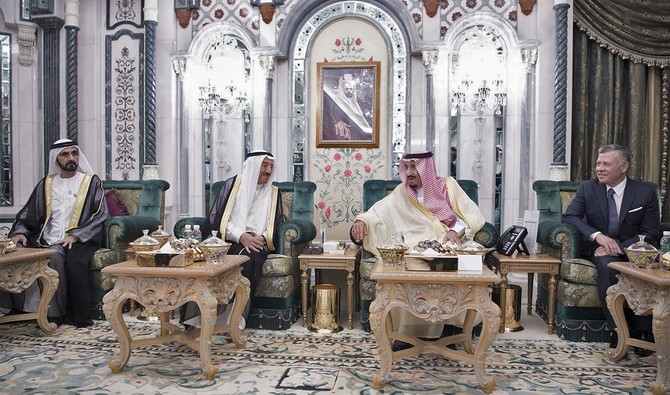AMMAN: Financial support agreed by Saudi Arabia, Kuwait and the UAE is a boost for new prime minister
For Jordanians, it was the timing of the announcement that was most significant.
The Kingdom is reeling from the effects of increased prices as part of an austerity drive to satisfy the International Monetary Fund (IMF) and news of an economic aid package worth $2.5 billion could not have been more welcome.
The agreement by Saudi Arabia, Kuwait and the United Arab Emirates came a week after widespread protests against a proposed income tax law had forced the resignation of the prime minister.
The Kingdom had once again been caught between balancing the anger of people facing rapidly increased living costs, and fiscal obligations to the IMF. Those obligations are seen as crucial to charting Jordan’s course away from vast public debt and toward economic growth.
The meeting in Makkah brought together King Salman, Jordan’s King Abdullah II, the UAE’s Prime Minister Sheikh Mohammed bin Rashid Al-Maktoum and Kuwaiti Emir Sheikh Sabah Al-Ahmad Al-Jaber Al-Sabah.
It was an unequivocal show of support by the three Gulf countries for one of their closest allies.
The package includes a deposit in the Jordanian Central bank, World Bank guarantees, budgetary support over five years and financing for development projects, said a summit communique reported by the Saudi Press Agency.
“What happened in Makkah in the past 24 hours is welcome news and gives people hope that things will improve,” Omar Malhas, the outgoing minister of finance, told Arab News.
Malhas said he was not aware of the details of the financial support and expressed some concern about the potential of further costs that may have to be paid in interest on aspects of the package.
“What we need is support to the annual budget and not any more loans,” Malhas said.
The finance minister is part of a caretaker government until the newly appointed Prime Minister Omar Razzaz sets up his cabinet.
Malhas said that Jordan is hoping to be able to access an $800 million loan from Japan, which has been conditional on certification from the IMF.
The IMF said last week that it would work with Jordan’s new government to complete a review that could trigger the release of another $70 million.
The EU also said that it would provide Jordan with $23.5 million to help ease its economic woes.
Jordan is struggling to curb its debt after securing a $723 million loan from the IMF in 2016.
News of the Gulf package was a boost to Razzaz as he met with heads of political parties and parliamentary coalitions on Monday in Amman.
Rula Hroub, the head of the Stronger Jordan party, told Arab News that the former World Bank economist stressed his support for the democratic process and Jordan’s diversity.
“He said he will work on a true partnership and will not try to monopolize any political decision making process,” Hroub said.
Razzaz, who withdrew the income tax law last week, said he supported the right of the people to protest and at the same time the civilized response from the security forces. He called the protests a more advanced expression of the frustrations that sparked protests during the Arab Spring.
After those protests, similar aid packages were prepared by Gulf countries in 2011 to support both Jordan and Morocco.
Awwad Zawaideh, a Jordanian member of parliament representing Bedouin communities in the south and a member of the finance and energy committees, praised the latest initiative. “I come from the south of Jordan and our tribes are split between Saudi Arabia and Jordan. Since the late King Faisal, Khaled, Fahad and Abdullah we have always depended on Saudi whenever we had a crisis,” he said.
Faisal Malkawi, economic editor at “Al Rai” newspaper, told Arab News that the move had many positive aspects for the economy.
“It helps stabilize our economy while reflecting a clear and positive change in the attitude of the Gulf countries,” he said.
Malkawi said that the support from Saudi Arabia, Kuwait and UAE “will not solve our major economic problems but it will put us on the right path.”
“The $2.5 billion that will address our immediate needs and our international obligations will get us out of the short term bottle neck and will buy us time.”
Munir Dayee, the head of the clothing union, which was involved in strikes against the income tax law, said that the events of the last few days had strengthened the markets.
“A combination of good news has provided the needed push for people to go out and buy things for the upcoming Eid Al-Fitr,” Dayee said.
The challenges for Jordan’s economy remain vast.
The World Bank says Jordan has “weak growth prospects” this year, while 18.5 percent of the working age population is unemployed.
And with the war still raging across the border in Syria, the struggle to get the economy back on track looks set to continue.



























